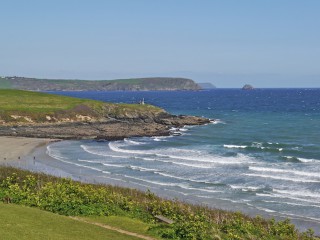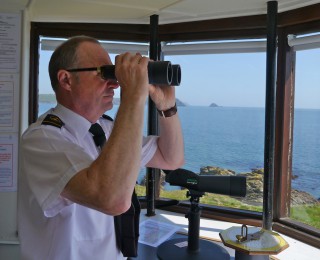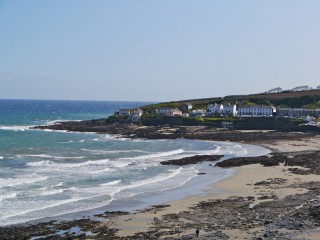Keep It Simple So We All Understand
 At our last Meeting Gerry gave us a talk on tides and, if you let it, what a complicated subject it can be. Most of us knew that the tides are caused by the pull of the Moon as it orbits the Earth. What we didn’t realise was that the moon’s orbit is not just a straightforward circuit but an ellipse so that its proximity to the Earth varies. Just to make things more complicated the Earth’s rotation on its axis is not vertical. It’s not straight up and down so to speak but on an angle.
At our last Meeting Gerry gave us a talk on tides and, if you let it, what a complicated subject it can be. Most of us knew that the tides are caused by the pull of the Moon as it orbits the Earth. What we didn’t realise was that the moon’s orbit is not just a straightforward circuit but an ellipse so that its proximity to the Earth varies. Just to make things more complicated the Earth’s rotation on its axis is not vertical. It’s not straight up and down so to speak but on an angle.
The whole jolly issue, Moon and Earth, rotate around a common gravitational centre. You keeping up so far? Perhaps I’ll leave it at that and do as we do in N.C.I. – keep it simple. All you need to know is that the tide for the day can be looked up in the Admiralty Tide Table which is kept in a folder in the Lookout. Anything else is for your interest only.
So far as our training is concerned we stick to essentials. Yes, you need to know what the tide is doing and when are High and Low Water. You need to know how to use the telescope/binoculars so you can see if something is wrong. You need to be able to identify a possible problem and how to pinpoint exactly where the casualty is by plotting a bearing and distance on a chart. You need to know how to pass that information to the Coastguard by means of a telephone. Then, when the Lifeboat shows up, you need to know how to direct the them to the casualty. You must also be able to operate our Marine Band radio.
All right, I have simplified it, but if you can do all of these things you can perform our major function – to look out for people in trouble and get them help. To that end we are about to start our winter Training Programme which runs separately from our monthly meetings and is intended to train up our new members to become fully qualified Watchkeepers, able to stand Watch on their own in the Lookout.
These are fun evenings with a serious intent. Each evening is devoted to one particular aspect. Despite all the laughter and chaffing which goes on, by the end of the session you should know, better still, understand, what it was all about and how to do it. You may need to be Einstein to understand why the tides do what they do but you only need common sense to follow our training.
 Our ‘bread and butter’ is what is happening in waters close in to land and we are bounded by Nare Head to the north-east and Grebe Point to the south-west. We cover the beaches we can see and are there as a contact point for anyone in trouble on the Coast Path. We are there to help people. Some over-reach themselves, thinking they can do more than they are able. Some just lack knowledge Some are careless or unthinking. Some just have plain bad luck.
Our ‘bread and butter’ is what is happening in waters close in to land and we are bounded by Nare Head to the north-east and Grebe Point to the south-west. We cover the beaches we can see and are there as a contact point for anyone in trouble on the Coast Path. We are there to help people. Some over-reach themselves, thinking they can do more than they are able. Some just lack knowledge Some are careless or unthinking. Some just have plain bad luck.
We are interested in ‘the little people’. Large ships do not concern us as they are professionally operated, well equipped and watched over by the MRCC at Falmouth. Occasionally one will come close in to anchor and wait for a few days but normally they are simply visible on the skyline – something to identify if you can out of interest rather than necessity.
We get some very odd things pass across from time to time, flat things with legs in the air, bulbous things that look like balloons, craft with immensely long afterdecks, warships – all this is for your personal interest if you want to look it up but you do not have to be an expert in ship recognition. The same with the radio. It is there, it is switched on and you must be able to operate it should the need arise. But the fact that HMS Daring is bitterly complaining about some French fisherman preventing him lobbing concrete blocks down the Range is only of interest to pass the time.
Similarly you may hear a French Coastguard saying’ ‘Securite, Securite, Securite.’ and burbling on about something happening off the Channel Islands. Not your problem. You will get to the point where the radio runs in the background, your increasing skill and confidence takes it all in and subconsciously sorts it, listening all the time for the important one – ‘MAYDAY, MAYDAY, MAYDAY…….’ You automatically reach to switch on our voice recorder and, at the same time, pick up pencil and paper. That is why you are there – that is why you spent all those evenings over in Portscatho Memorial Hall learning how to record the call, listen for it to be acknowledged, and, if not, pass it on to Falmouth Coastguard.
 The bird life is interesting if you are into birds and if you are lucky you may see dolphins or a basking shark. But that is not why you are there. Your are watching the teenage boy who is not very good on his sailboard or the children playing with the airbed – are they getting out rather a long way? And what about that lunatic who has just appeared around Pencabe on his jet ski and is bearing down upon the swimmers off the beach? Is he going to keep up his present 20 knot speed? Or will he reduce it to a safe speed before he gets among them?
The bird life is interesting if you are into birds and if you are lucky you may see dolphins or a basking shark. But that is not why you are there. Your are watching the teenage boy who is not very good on his sailboard or the children playing with the airbed – are they getting out rather a long way? And what about that lunatic who has just appeared around Pencabe on his jet ski and is bearing down upon the swimmers off the beach? Is he going to keep up his present 20 knot speed? Or will he reduce it to a safe speed before he gets among them?
This is what this voluntary job is all about – providing a safety net for all those people who use our inshore waters, beaches and paths. Thankfully, though we have played our part in many incidents which could have turned nasty, we have, so far, been spared the ultimate tragedy of someone’s death. We have one big weakness, however. We have insufficient volunteers to provide cover every day of the summer months. If you think you could help please give Bob a ring on 01872-580720 or Robert on 501670. No one is going to commit you to anything,

